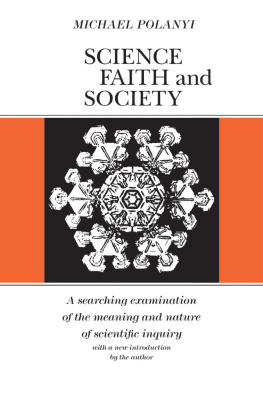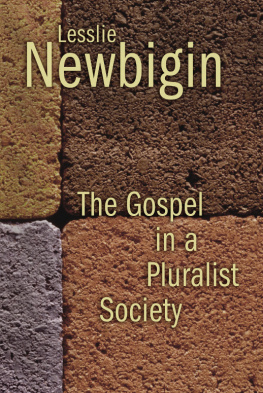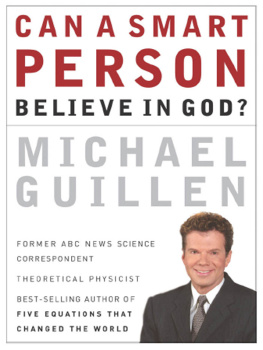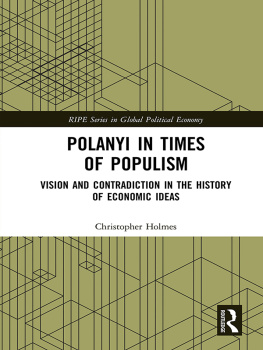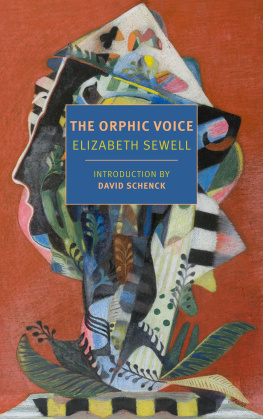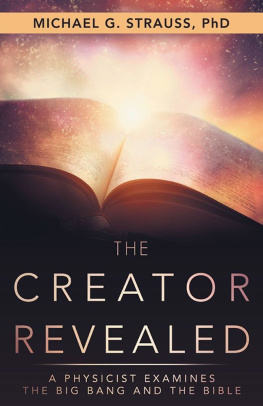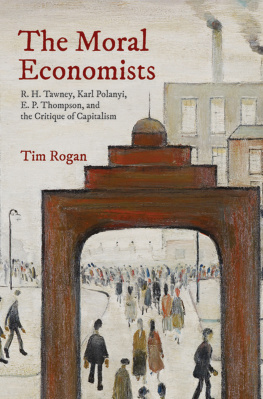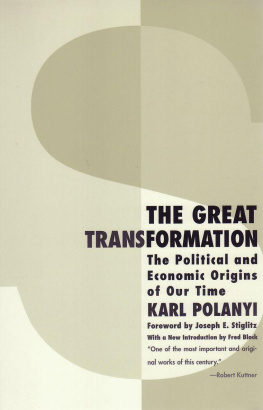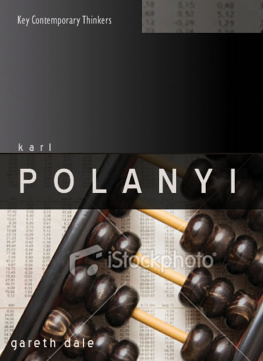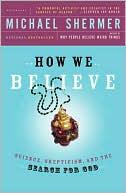Michael Polanyi - Science, Faith and Society
Here you can read online Michael Polanyi - Science, Faith and Society full text of the book (entire story) in english for free. Download pdf and epub, get meaning, cover and reviews about this ebook. year: 1946, publisher: University of Chicago Press, genre: Science. Description of the work, (preface) as well as reviews are available. Best literature library LitArk.com created for fans of good reading and offers a wide selection of genres:
Romance novel
Science fiction
Adventure
Detective
Science
History
Home and family
Prose
Art
Politics
Computer
Non-fiction
Religion
Business
Children
Humor
Choose a favorite category and find really read worthwhile books. Enjoy immersion in the world of imagination, feel the emotions of the characters or learn something new for yourself, make an fascinating discovery.
- Book:Science, Faith and Society
- Author:
- Publisher:University of Chicago Press
- Genre:
- Year:1946
- Rating:3 / 5
- Favourites:Add to favourites
- Your mark:
- 60
- 1
- 2
- 3
- 4
- 5
Science, Faith and Society: summary, description and annotation
We offer to read an annotation, description, summary or preface (depends on what the author of the book "Science, Faith and Society" wrote himself). If you haven't found the necessary information about the book — write in the comments, we will try to find it.
Science, Faith and Society — read online for free the complete book (whole text) full work
Below is the text of the book, divided by pages. System saving the place of the last page read, allows you to conveniently read the book "Science, Faith and Society" online for free, without having to search again every time where you left off. Put a bookmark, and you can go to the page where you finished reading at any time.
Font size:
Interval:
Bookmark:


The University of Chicago Press, Chicago 60637
The University of Chicago Press, Ltd., London
1946 by Michael Polanyi. Published 1946 by Geoffrey Cumberlege
Oxford University Press, London
Introduction 1964 by The University of Chicago
All rights reserved. Published 1964
Printed in the United States of America
17 16 15 14 13 12 11 10 09 08 12 13 14 15 16
ISBN-13: 978-0-226-16344-4 (e-book)
ISBN-13: 978-0-226-67290-8 (paper)
ISBN-10: 0-226-67290-5 (paper)
The paper used in this publication meets the minimum requirements of the American National Standard for Information SciencesPermanence of Paper for Printed Library Materials, ANSI Z39.48-1992.
SCIENCE, FAITH AND SOCIETY
MICHAEL POLANYI

THE UNIVERSITY OF CHICAGO PRESS
CHICAGO AND LONDON
IN AUGUST 1938 the British Association for the Advancement of Science founded the Division for the Social and International Relations of Science, which was to give social guidance to the progress of science. A movement for the planning of science spread and became predominant among scientists interested in public affairs. A small number of scientists, to which I belonged, strenuously opposed this movement.
In December 1945 the Division called a meeting to discuss planning and asked me to open the proceedings. My address renewed my criticism of planning and upheld the traditional independence of scientific enquiry. I expected a hostile reaction, but, to my surprise, speakers and audience showed themselves in favour of science pursued freely for its own sake. Since then the planning movement has dwindled to insignificance in Britain, but the theoretical problems it has raised are still with us. They are part of the general impact made by the Russian Revolution on the minds of men everywhere.
After the Revolution, scientific research in Soviet Russia was divided into two sections. One was conducted in the light of dialectical materialism under the leadership of the Communist Academy founded in 1926. Membership in the Academy was confined to Party members. Scientists forming the other section worked freely in constant touch with Western scientists. In 1932 a change occurred affecting both sides. The Soviet government repudiated the wild dialectical speculations of the Communist Academy and covered them with ridicule. At the same time, however, the other part of science, hitherto conducted on traditional lines, was bidden to acknowledge the supremacy of dialectical materialism. A declaration to this effect can be found in the editorial opening of the new German-language physics journal of the Soviets, founded in that year; it was inserted at the request of the Party. Russias most distinguished biologist, N. I. Vavilov, was induced, in the same year, to denounce the theoretical pursuit of genetics practised in the West and to accept instead the view of science planned to serve economic needs, as declared by the Conference on Planning Genetics Selection Research in Leningrad.
At Easter 1935 I visited N. I. Bukharin in Moscow. Though he was heading for his fall and execution three years later, he was still a leading theoretician of the Communist party. He explained to me that the distinction between pure and applied science, made in capitalist countries, was due to the inner conflict of this type of society which deprived scientists of the consciousness of their social functions, thus creating in them the illusion of pure science. Accordingly, Bukharin said, the distinction between pure and applied science was inapplicable in the Soviet Union. This implied no limitation on the freedom of research; scientists would follow their interests freely in the U.S.S.R., but, owing to the internal harmony of socialist society, they would inevitably be led to lines of research which would benefit the current Five Year Plan. The comprehensive planning of all research was to be regarded merely as a conscious confirmation of the pre-existing harmony between scientific and social aims.
In 1935 I could still smile at this dialectical mystery mongering, never suspecting how soon it would show terrible consequences. Vavilovs persecution at the hands of T. D. Lysenko had already begun. It led to his dismissal from office in 1939 and then to his arrest and death in a prison camp around 1943. This campaign wrought havoc among biologists and paralysed whole branches of biology in Soviet Russia from 1939 until well after Stalins death in 1953. The physical sciences got off more lightly. By the time of this writing, the natural sciences have been almost completely liberated from ideological subservience to Marxism, which continues to be imposed on the study of economics, sociology and the humanities.
I have said that in England the campaign for the planning of science, evoked by the enforcement of Marxist philosophy in the Soviet Union, never became a serious menace. But the mental disturbance caused by it was profound. A distinguished scientist like Lancelot Hogben could write:
From the landmans point of view the earth remained at rest till it was discovered that pendulum clocks lose time if taken to places near the equator. After the invention of Huyghens, the earths axial motion was a socially necessary foundation for the colonial export of pendulum clocks.
Many such absurd theories were put forward in Hogbens famous book Science for the Citizen (1938), which had a vast circulation. An account of the considerable literature moving on similar lines is given in my book The Logic of Liberty (1951).
It was difficult to get a hearing for opposing views. Those who knew about the persecution of biologists in Soviet Russia would not divulge their information. My writings and those of J. R. Baker which, from 1943 on, exposed this persecution were brushed aside as anti-Communist propaganda. The way in which scientific research was organised in Soviet Russia was held up as an example to be followed. Public meetings, attended by distinguished British scientists, gave currency to this appeal.
It was in facing these events that I became aware of the weakness of the position I was defending. When I read that Vavilovs last defence against Lysenkos theories, in 1939, was to evoke the authority of Western scientists, I had to acknowledge that he was appealing to one authority against another: to the authority accepted in the West against the authority accepted in Soviet Russia. The meeting had been called by the editors of the journal Under the Banner of Marxism. Their acceptance of Lysenkos authority was based on their philosophy of science. What philosophy of science had we in the West to pit against this? How was its general acceptance among us to be accounted for? Was this acceptance justified? On what grounds?
Marxism has challenged me to answer these questions: the essays republished here were written in reply to them. Like the Marxist theory, my account of the nature and justification of science includes the whole life of thought in society. In my later writings it is extended to a cosmic picture. But the ultimate justification of my scientific convictions lies always in myself. At some point I can only answer, For I believe so. This is why I speak of Science, Faith and Society.
I first analysed the process of knowing, as is usual, in isolation. There are an infinite number of mathematical formulae which will cover any series of numerical observations. Any additional future observations can still be accounted for by an infinite number of formulae. Moreover, no mathematical function connecting instrument readings can ever constitute a scientific theory. Future instrument readings cannot ever be predicted. But this is merely a symptom of a deeper inadequacy, namely, that the explicit content of a theory fails to account for the guidance it affords to future discoveries. To hold a natural law to be true is to believe that its presence will manifest itself in an indeterminate range of yet unknown and perhaps yet unthinkable consequences. It is to regard the law as a real feature of nature which, as such, exists beyond our control.
Font size:
Interval:
Bookmark:
Similar books «Science, Faith and Society»
Look at similar books to Science, Faith and Society. We have selected literature similar in name and meaning in the hope of providing readers with more options to find new, interesting, not yet read works.
Discussion, reviews of the book Science, Faith and Society and just readers' own opinions. Leave your comments, write what you think about the work, its meaning or the main characters. Specify what exactly you liked and what you didn't like, and why you think so.

